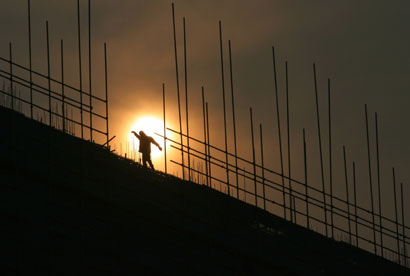GDP expected to grow 10.5% in 2006
(Xinhua)
Updated: 2006-10-11 11:26
China's gross domestic product (GDP) is expected to rise by 10.5 percent in
2006, the Chinese Academy of Social Sciences (CASS), a major official think
tank, said in a report.
The CASS report, made available to Xinhua Wednesday, also
forecast that the country's economic growth rate would slow to 10.1 percent in
2007, thanks to the government's macro control policies.

A labourer works on scaffoldings at a
construction site in Nanjing, east China's Jiangsu province October 11,
2006. China's economic growth is likely to slow modestly to around 10
percent in 2007 from 10.5 percent this year as government tightening
measures kick in, a top government think-tank said in a report published
on Wednesday. [Reuters] |
The National Bureau of Statistics had earlier estimated the country's
growth in the first half year at 10.9 percent, the highest in recent years.
The report predicted that China's trade surplus will hit a new high of
US$158 billion in 2006. It will drop to US$123 billion in 2007.
Sustained growth in China's trade surplus has led to a rapid increase in
the country's foreign reserves, which are widely expected to break the one
trillion dollar mark in October.
This has in turn cranked up pressure
for a revaluation of the Chinese currency yuan. China's biggest trade partner,
the United States, has threatened to slam punitive duties on Chinese imports if
the yuan is not revalued.
The CASS report said oversupply in some
industries has forced producers to seek bigger overseas market shares.
It suggested that China further reform its foreign exchange rate
determination mechanism and overhaul its export tariff rebate system to check
the growth of its exports.
Runaway investment is another major headache
for China's policy makers, forcing the government to keep tweaking macro control
policies.
The macro control policies, including interest rate hikes and
tightening of credit and land supply, have begun to have an effect.
The
report said growth of fixed asset investment for the whole of 2006 will be
around 24.8 percent, down from around 30 percent in the first six months. It
would further fall to 20.4 percent in 2007.
"The macro economy is
basically running well. The chances of crossing from 'a bit too fast' to
'overheating' are dwindling," the report said.
It warned that macro
control policies must be retained in 2007 to prevent investments from bouncing
back.
The report stressed the need to shore up people's incomes, so that
economic growth is less dependent on investment and exports and more on
consumption.
| 1 | 2 |  |
|